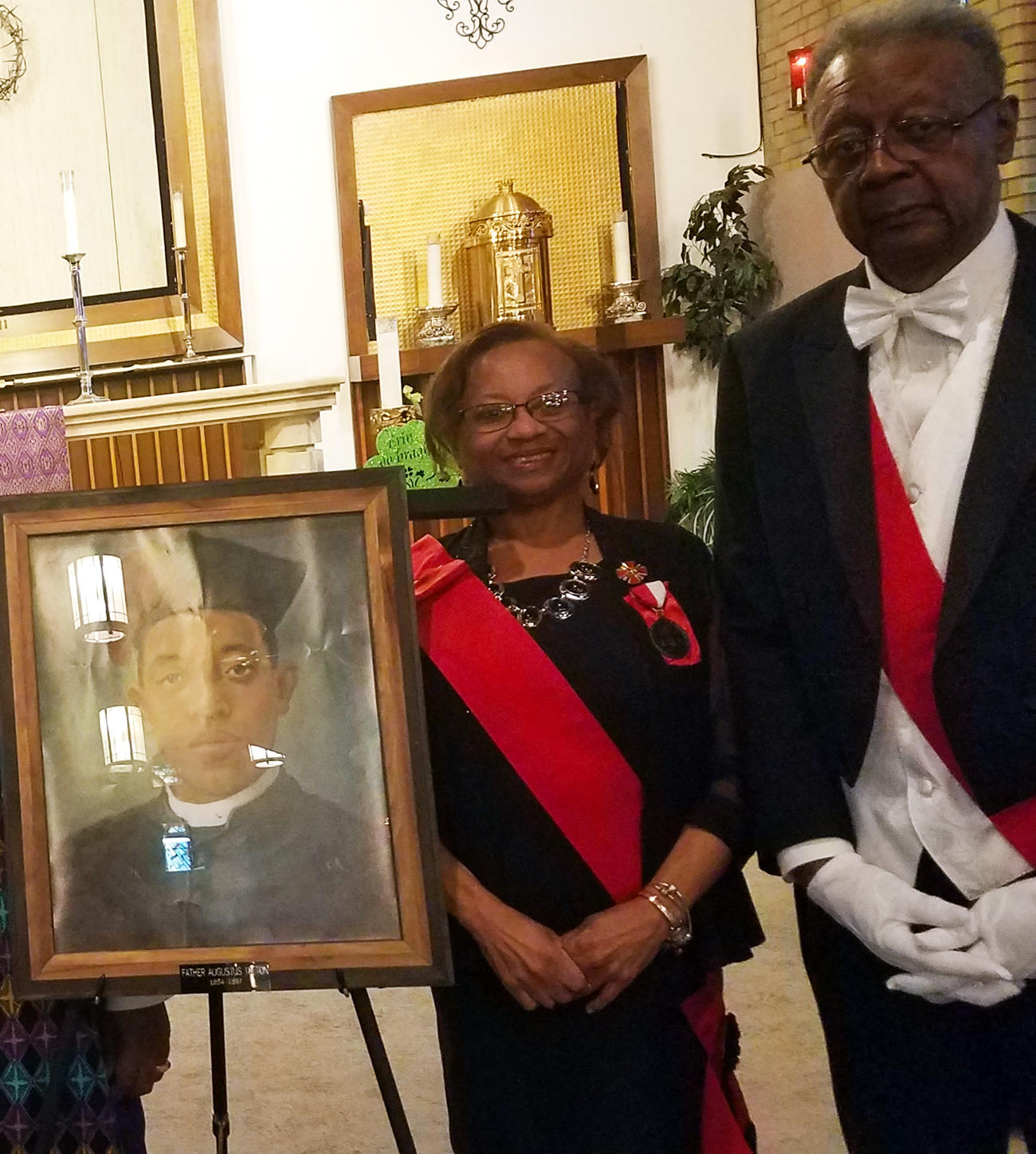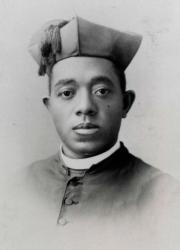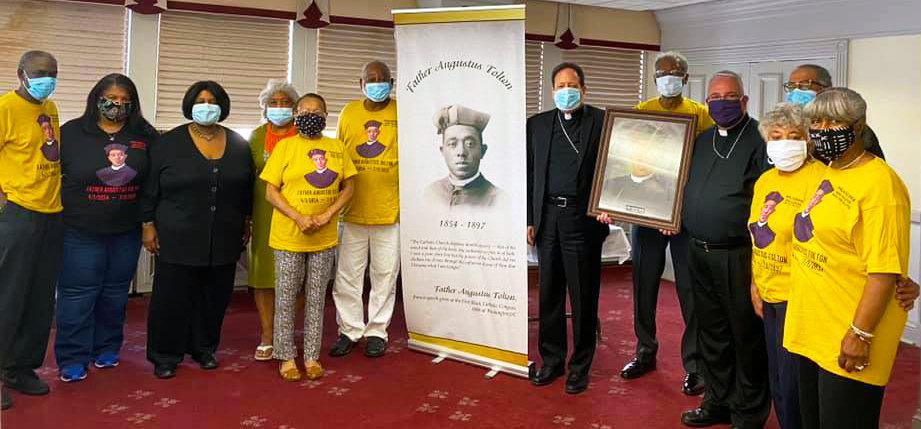
Madeline and Ernest Tymes of St. Charles Borromeo Parish in South Philadelphia serve as Tolton Ambassadors, who promote awareness of Father Augustus Tolton, the first Roman Catholic priest in the U.S. known to be Black. Father Tolton was declared “Venerable” by Pope Francis in 2019. (Photo courtesy of Madeline and Ernest Tymes)
A saint in the making continues to receive support for his canonization, thanks to a number of area faithful who are working hard to spread the word about his holiness.
Father Augustus Tolton, the first Roman Catholic priest in the U.S. known to be Black, is “on the fast track to becoming a saint,” said Madeline Tymes, a member of St. Charles Borromeo Parish in South Philadelphia.
“But,” she cautioned, “the process is very intricate.”
Born into slavery April 1, 1854, Augustus Tolton was raised as a Catholic, the faith held by the Missouri-based families who had purchased his parents. In 1862, his father escaped to serve the Union Army during the Civil War, but soon died of illness; his mother thereafter fled with young Augustus and his two siblings, rowing them across the Mississippi River and eventually reaching Quincy, Illinois, where they settled.
After working in a factory and attending Catholic schools (often facing harassment in the process), Tolton moved to Rome in 1880 to enter the seminary. Upon his 1886 ordination there, he was assigned first to Quincy and later Chicago.
In both cities, his charity, reverence and pastoral zeal endeared him to Black and white parishioners, and he corresponded with the future St. Katharine Drexel, who helped to support his ministry. Father Tolton’s poverty, combined with his strenuous schedule, likely hastened his untimely death from heat stroke and uremia in 1897.
[hotblock]
Chicago Cardinal Francis George (now deceased) announced the cause for Father Tolton’s canonization in 2010; nine years later, Pope Francis declared Father Tolton “Venerable.”
The effort is proceeding at a brisk pace, although there’s still a long way to go, said Tymes, who along with her husband Ernest is a “Tolton Ambassador.”
Commissioned in 2017 by Chicago Auxiliary Bishop Joseph Perry, the diocesan postulator for Tolton’s cause, the Philadelphia Archdiocese’s 11 ambassadors hail from a number of the city’s parishes, including St. Athanasius, St. Barbara, St. Ignatius of Loyola, Our Lady of Hope and the Tymes’ parish, St. Charles Borromeo.

Father Augustus Tolton
(CNS photo/Courtesy of Archdiocese of Chicago Archives and Records Center)
The Philadelphia chapter has “a dynamite core group” led by presiding governor and St. Athanasius parishioner Eugene Frasier, said Ernest.
The Tymeses, both conveners in the organization, are among some 60 ambassadors nationwide who are committed to sharing information about the life and impact of Father Tolton, while encouraging people to seek his intercession and to pray for his canonization.
“Education and prayer are the most important,” said Madeline.
Recently, the Philadelphia Tolton Ambassadors met with Archbishop Nelson Pérez and Auxiliary Bishop John McIntyre regarding the outreach.
“They shared with us their passion and prayerful support of the amazing life and legacy of Father Augustus Tolton,” said Archbishop Pérez, who described the group as “wonderful women and men of great faith.”
He offered them his “blessing and support for their local work,” which Ernest Tymes admits has been somewhat “handcuffed by COVID.”
Normally, the ambassadors visit parishes to provide a portrait of Tolton, relate his story and then raise funds through the sale of t-shirts, hats and books, including a children’s book about his life.
The monies are then sent to the Archdiocese of Chicago, which is sponsoring Tolton’s canonization cause.
With pandemic restrictions still in place, those initiatives have shifted to a virtual format. A national fundraising event for the effort, “Tolton’s Legacy: A Road Map to Unity – 2020 Vision,” will take place via Zoom on Aug. 29 at 8 p.m. (ET). Presenters will include Archbishop Wilton Gregory of the Archdiocese of Washington, D.C., Bishop Perry and Professor Cecilia Moore of the University of Dayton.
Whether online or in person, the path to canonization is both “lengthy and costly,” said Ernest Tymes.
“We’ve learned that even though God blesses folks to become saints, it’s the church that canonizes,” he said. “So you run into this time warp, but we have no doubt that through God’s intervention, Father Tolton will be declared a saint.”
That recognition would provide hope and inspiration at a critical moment in the nation’s history, said the Tymeses.
“People are so grateful to hear about him; they’re just so amazed,” said Madeline.
Ernest agreed, noting that “it really does open your eyes” to learn of “all the trials and tribulations” Tolton endured.
“He was really beset by racism on all sides, but to see how charitable he was, how cheerful — he had an open, optimistic spirit,” he said.
Faith and the sacraments sustained Tolton, he added.
“He was committed to the Eucharist, to the church, and in his duties always obedient to the church,” he said. “He saw Christ in everyone he met, even in the priests who were against him and talked badly about him. He was always in prayer.”
Prayer is the very thing that will eventually usher in Tolton’s canonization and a greater recognition of his saintly life, said the Tymeses.
And while they remain focused on Tolton’s cause, they’re also pulling and praying for a number of other Black Catholics currently in line for sainthood, including Venerable Pierre Toussaint (1776-1853), a former slave who became an entrepreneur and philanthropist; Mother Mary Elizabeth Lange (1784-1882), foundress of the Oblate Sisters of Providence; Venerable Henriette Delille (1813-1862), foundress of the Congregation of the Sisters of the Holy Family; Julia Greeley (born between 1833 and 1848; died 1918), a former slave who promoted devotion to the Sacred Heart of Jesus; and Sister Thea Bowman (1937-1990), who converted to Catholicism as a child and entered religious life as a Franciscan Sister of Perpetual Adoration.
“It’s a little bit of competition between them,” said Madeline. “And a little bit of holy competition is good.”

Philadelphia-area Tolton Ambassadors met with Archbishop Nelson Peréz (fourth from right) and Auxiliary Bishop John McIntyre (to the right of the banner), July 23. The group received the bishops’ blessing for its work, which spreads awareness of the saintly life of Father Augustus Tolton, the first Roman Catholic priest in the U.S. known to be Black. (Photo courtesy of the Archdiocese of Philadelphia)
PREVIOUS: Rosary rally on Aug. 15 calls for ‘radical transformation’ of nation
NEXT: Archdiocese brings senior housing to suburbs



Share this story